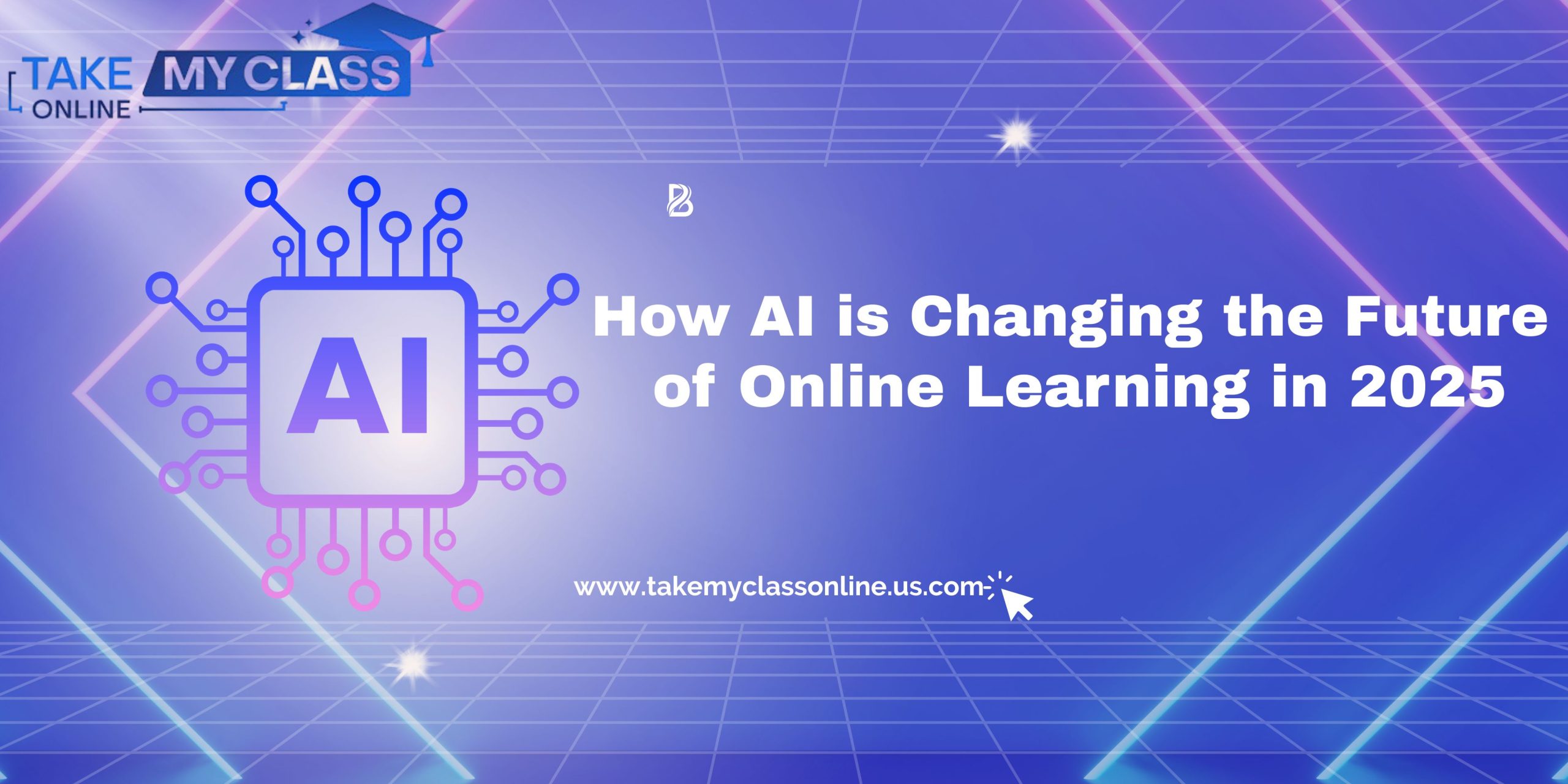
How AI is Changing the Future of Online Learning in 2025
Recent statistics indicate that 86% of students worldwide are now accessing AI in their education, 54% weekly and 25% day-to-day, illustrating how AI is no longer niche but essential in education.
Think about logging onto a lesson, and instead of reading the same text as everyone in the online classroom, the lesson is also customized just to you. This is the power of AI in online education. It makes studying self-paced, personalized, and interactive.
Simultaneously, virtual classroom etiquette is polishing the way the students are communicating and collaborating online. These changes are defining the future of a more engaging, respectful, and global education.
This blog contains facts about the prospects of education in 2025, including how AI is altering education and the best resources available to students.
A New Era of Personalized Learning
Globally, artificial intelligence is changing the field of education. AI in online education will become ubiquitous by 2025. It forms the basis of a contemporary classroom.
Lessons are now customized to each student.
AI provides additional practice when you are having trouble. In case you are in the lead, it introduces more demanding tasks. This is less stressful and more effective to all.
Even those students who seek online class help take advantage. Artificial Intelligence tools are present as tutors and assist precisely when there is a need.
For example, a student who has trouble with making mathematical calculations and algebra may be granted some additional quizzes, whereas the students who are good at history can use extended readings. This will make all the students stay active.
How AI is Making Classrooms Smarter and More Interactive
Online learning is no longer a backup plan. With the concept of artificial intelligence in virtual classrooms, the process of interaction between teachers and students is established in real-time.
From Listening to Doing
Students do not attend lectures. They are engaged in lessons that react to their actions. Fun interactive materials and polls make learning animated.
Tracking Focus and Engagement
AI can detect when attention drops. To keep attention, it may include an examination, a video, or a task. This keeps students engaged without overwhelming them.
Supporting Teachers
AI helps teachers, too. It handles grading, attendance, and routine questions. This allows teachers to focus on guiding students personally.
AI Study Tools for Students
Notes and books are not sufficient anymore. AI study tools for students simplify the process of acquiring knowledge, including learning at a faster pace and experiencing less stress about it.
Save Time
Artificial intelligence-based summarizers summaries lengthy texts into compact, important notes. Students can review lessons in their free time.
Stay Focused
Adaptive quizzes identify weak areas. Distraction-blocking apps help students stay on track during study sessions.
Build Confidence
Practice tests with instant feedback reduce stress. Each correct answer builds trust in a student’s skills.
Real-Life Examples:
- Quiz apps that increase in levels automatically.
- Students can use flashcard apps to memories facts easily.
- Grammar and structure writing assistants are available.
- Abstract topics are experienced through immersive simulations.
These applications will simplify or give a speedier study time.
Why the Future of AI in Education Looks Bright
The future of AI in education goes beyond technology. It ultimately boils down to preserving the affordability and accessibility of education.
The USA Leading the Way
The future of e-learning USA is yielding fruits. Auto-grading, adaptive, and AI tutoring are used in many schools. Students get additional assistance, and teachers save valuable time.
Global Impact
So, what is the future of AI in education? Experts say it’s about inclusivity. Real-time translation tools allow students to learn in their own language. Barriers to global education are falling quickly.
Preparing Students for Future Jobs
AI lessons help students develop practical skills. Coding, problem-solving, and creative thinking are part of AI-enhanced curricula. Students are prepared for a workplace increasingly driven by technology.
Hybrid or online? How AI Blends the Best of Both Worlds
The argument on whether to make remote vs online classes is changing. The technology of AI is making it possible to have a hybrid model of learning in which the best of both worlds can be applied. Students may have in-person classes and get online access to AI-created notes.
Hybrid Classrooms in 2025
Flexible, hybrid learning benefits the students. AI platforms offer assistance to students who have missed a lesson and can revise them anytime.
Connecting Students Everywhere
AI links students in different places. The group chatbots and translation tools allow employees to communicate without limits because of time zones. This guarantees equal participation and minimizes isolation.
Flexible Learning Schedules
Students can learn anywhere. AI personalizes lessons to balance individual needs, so that students can manage their time to avoid falling behind.
Real-Time Feedback and Support
AI gives an immediate response to assignments and quizzes. Students may constantly develop without having to wait till the teacher detects a reaction.
Top Tech Tools Every Student Needs for Smarter Learning
In 2025, learning can be done most efficiently with adequate tools. The best gadgets for students facilitate AI-powered learning and optimize the process.
- Tablets and smart notebooks make taking notes and sharing convenient.
- Noise-canceling headphones to remain focused.
- Smartwatches and wearables to monitor hours spent in the study and stress.
- VR headsets are used in virtual labs and real-life simulations.
- Ergonomic desks, smart lamps, and others are used to minimize fatigue and promote good posture.
These tools, with the help of the AI, will make studying much easier, healthier, and more productive.
How AI is Simplifying Students’ Daily Learning Routines
To a great number of students, AI can already be observed in everyday lives. Digital planners, smart tutors, and interactive platforms are no longer unusual as tools. This is topped up with some providing an online class taker service.
This is an indication of how AI introduces convenience and responsibility to the process and assists students in managing studies, work, and personal life effectively.
Digital Planners Keep Students Organized
Smart planners assist students in keeping their assignments, deadlines, and study time in check, thus alleviating stress and addressing time management daily.
Smart Tutors Provide Instant Help
Interactive AI tutors lead the student through the making of difficult tasks, giving students explanations and exercises when they are needed.
Platforms Offering Online Class Taker Services
There are even platforms where students can be taught by an online class, and this provides flexibility to busy students and can keep them at a stable pace in their academic work.
Personalized Study Recommendations
AI evaluates the progress and provides specific lessons or quizzes so that the student can improve by working on weak areas and learning more efficiently.
Traditional Learning vs AI-Powered Classrooms
Feature | Traditional | AI in 2025 |
Lesson Pace | Same for all | Adjusts to each student |
Feedback | Delayed | Instant |
Tools | Books, Notes | AI study tools for students |
Interaction | Face-to-face only | Global, 24/7 |
Exam Prep | Manual revision | Smart quizzes and simulations |
How AI Supports Students Daily
AI assists students in creating a plan to study, follow up, and remain on track with assignments. Some students use websites that enable them to take my online class for me, leaving more time to devote to work or other responsibilities. AI service helps to make daily learning efficient, flexible, and stress-free.
Smarter Research
AI enables students to source credible information fast. It presents important information and makes omissions of irrelevant information.
Language Assistance
The translation tools enable the students to read and write in their native language. This facilitates inclusivity.
Time Management
AI planners plan studying time, breaks, and due dates. Students are organized in a way that does not feel overpowering.
Interactive Group Projects
AI sets the tasks, monitors the completion of these tasks, and gives immediate feedback. Students learn to work better as a team and with equality.
Hurdles Ahead: Challenges AI Must Solve in Education
Although the impact of AI on education is overwhelming, factors of concern still exist:
- Access: Not every student possesses devices or regular internet access.
- Teacher Training: Teachers will have to be trained on the application of AI tools.
- Data Privacy: There should be security for student information.
- Accuracy: AI may be inaccurate or biased; it is critical to monitor.
Addressing these issues is vital for the future of AI in education to reach its full potential.
Conclusion: The Smarter Future Ahead
AI is revolutionizing classrooms. Whether bearing on analyzing tools, students, or an entirely virtual classroom, all of this technology increases learning and reduces stress.
The future of AI in education does not imply instructors being replaced. It is a question of giving every student additional resource and self-confidence, and equal opportunities.
The hybrid classrooms, smart technologies, and AI-based lessons make the learning process more comfortable, time-saving, and more exciting. The future classroom is smarter and takes into consideration those of us who are smarter.
Frequently Asked Questions
It helps make lessons personalized to every student, and their progress is easily tracked, as well as getting the workload off the teachers.
No. AI may never be able to displace teachers as they offer guidance, mentorship, and emotional support that cannot clearly be achieved through AI.
Students can study faster, pay more attention, better comprehend, and lessen exam anxiety with study aids.
Yes, provided that the person has a stable internet, the right equipment, and the availability of AI platforms in their location.
Yes. The future of AI in education holds the potential to be more intelligent, personalized, efficient, and engaging learning experiences.
